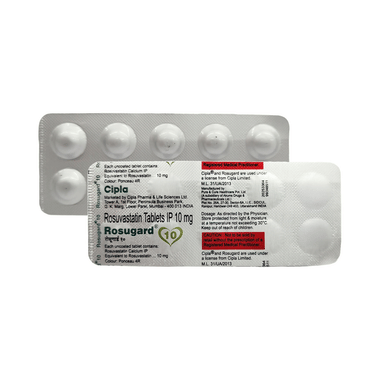Rosid 10 Tablet
 Prescription Required
Prescription Required

Product introduction
Rosid 10 Tablet can be taken with a meal or on an empty stomach. You can take it at any time of the day, but try to take it at the same time each day. Most people with high cholesterol do not feel ill. Do not stop taking the medicine suddenly without your doctor’s advice. Stopping your medicine may increase your cholesterol levels, making your condition worse and increasing your risk of heart disease and stroke.
This medicine is only one part of the treatment program, which should also include a healthy diet, regular exercise, smoking cessation, moderation of alcohol intake, and weight reduction. You can eat normally while taking this medicine, but try to avoid foods that are high in fat. It is important to have your cholesterol levels checked regularly.
Common side effects of this medicine include muscle pain, weakness, nausea, headache, and abdominal pain. These are usually mild and disappear after a short time. Consult your doctor if they persist or if you notice any yellowing of your eyes or get repeated or unexplained muscle pains.
This medicine should not be used in conditions such as liver disease. Also, pregnant women and breastfeeding women should not take this medicine, as it may harm the developing baby. Diabetic patients should monitor their blood sugar levels while taking this medicine, as it may lead to an increase in blood sugar levels.
Uses of Rosid Tablet
- Treatment of High cholesterol
- Treatment of High triglycerides
- Prevention of heart attack and stroke
Benefits of Rosid Tablet
In Treatment of High cholesterol
In Treatment of High triglycerides
In Prevention of heart attack and stroke
Side effects of Rosid Tablet
Common side effects of Rosid
- Muscle pain
- Nausea
- Weakness
- Headache
- Abdominal pain
- Dizziness
- Joint pain
How to use Rosid Tablet
How Rosid Tablet works
Safety advice
Use of Rosid 10 Tablet is not recommended in patients with severe kidney disease.
Use of Rosid 10 Tablet is not recommended in patients with severe liver disease and active liver disease.
What if you forget to take Rosid Tablet?
All substitutes
Quick tips
- Rosid 10 Tablet is generally safe and well-tolerated; however, it may cause diarrhea, gas, or an upset stomach in some people. If any of these happen to you, take it with food.
- Inform your doctor if you experience fatigue, muscle weakness, or muscle pain.
- Your doctor may check your liver function before starting the treatment and regularly thereafter. Inform your doctor if you notice signs of liver problems, such as stomach pains, unusually dark urine, or yellowing of skin or eyes.
- Inform your doctor if you have kidney disease, liver disease, or diabetes before starting treatment with this medicine. If you are diabetic, monitor your blood sugar level regularly, as Rosid 10 Tablet may cause an increase in your blood sugar level.
- Do not take Rosid 10 Tablet if you are pregnant, planning a pregnancy, or breastfeeding.
Fact Box
Interaction with drugs
Patient concerns
FAQs
For how long should I take Rosid 10 Tablet?
Does Rosid 10 Tablet cause weight gain?
Does Rosid 10 Tablet make you tired?
Should Rosid 10 Tablet be taken at night?
What foods should be avoided when taking Rosid 10 Tablet?
How do I know whether Rosid 10 Tablet is beneficial for me or not?
Can Rosid 10 Tablet cause memory loss?
Can Rosid 10 Tablet cause muscle problems or muscle injury?
Is it true that Rosid 10 Tablet can cause diabetes?
Related ayurvedic ingredients
Disclaimer:
Tata 1mg's sole intention is to ensure that its consumers get information that is expert-reviewed, accurate and trustworthy. However, the information contained herein should NOT be used as a substitute for the advice of a qualified physician. The information provided here is for informational purposes only. This may not cover everything about particular health conditions, lab tests, medicines, all possible side effects, drug interactions, warnings, alerts, etc. Please consult your doctor and discuss all your queries related to any disease or medicine. We intend to support, not replace, the doctor-patient relationship.References
- Bersot TP. Drug Therapy for Hypercholesterolemia and Dyslipidemia. In: Brunton LL, Chabner BA, Knollmann BC, editors. Goodman & Gilman’s: The Pharmacological Basis of Therapeutics. 12th ed. New York, New York: McGraw-Hill Medical; 2011. pp. 893-902.
- Gotto AM Jr, Opie LH. Lipid-Modifying Antiatherosclerotic Drugs. In: Opie LH, Gersh BJ, editors. Drugs for the Heart. 8th ed. Philadelphia, Pennsylvania: Elsevier Saunders; 2013. pp. 420-22.
- Briggs GG, Freeman RK, editors. A Reference Guide to Fetal and Neonatal Risk: Drugs in Pregnancy and Lactation. 10th ed. Philadelphia, PA: Wolters Kluwer Health; 2015. pp. 1238-39.
Marketer details
Lab tests offered by us











